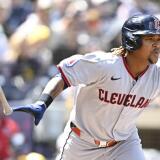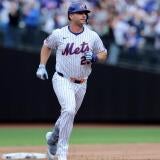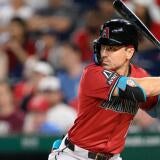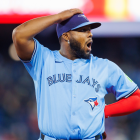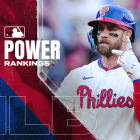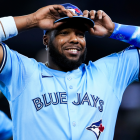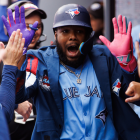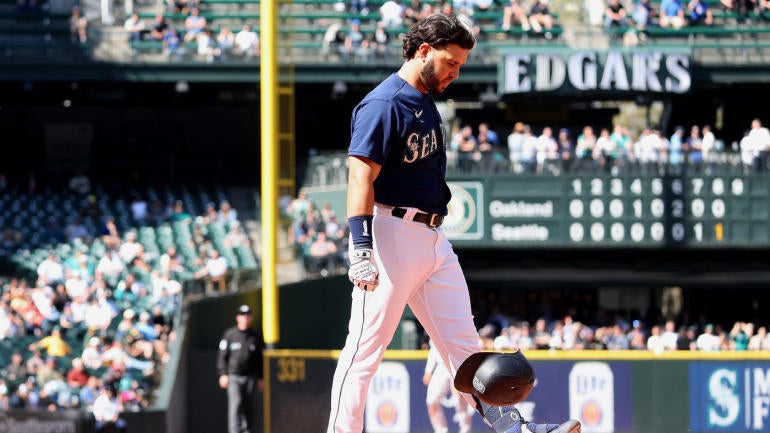
Thanks to the magic of Fun Differential, the 2021 Seattle Mariners were the franchise's most successful team since the days of Ichiro Suzuki and Jamie Moyer. They went into the final weekend with a chance to secure the club's first postseason berth in a generation, and while they ultimately fell short, the Mariners and their fans had plenty of reasons to be optimistic for 2022.
"I think we're in a position to take the next step," manager Scott Servais told MLB.com in spring training. "But it only happens if you get better. And that's not going to change. Just focus on getting better, one percent better every day when you come to work. And if you look up, this guy gets one percent better and that guy gets one percent better and I get one percent better, we're probably going to be OK."
Seven weeks into 2022, the Mariners look like the furthest thing from a postseason club. They have lost 21 of their last 28 games and were outscored 144-93 in the process. Earlier this week the Mariners dropped two of three at home to the Oakland Athletics, a team that isn't even trying to contend. Seattle currently sits in the AL West basement:
- Houston Astros: 29-16
- Los Angeles Angels: 27-19 (2 1/2 GB)
- Texas Rangers: 20-23 (8 GB)
- Oakland Athletics: 19-28 (11 GB)
- Seattle Mariners: 18-27 (11 GB)
The current standings indicate it will take 88 wins to qualify for the postseason in the American League (it will likely require 90-91 wins when it's all said and done, but let's roll with it), and for the Mariners to win 88 games, they need to go 70-47 the rest of the way. That's a 97-win pace across a 162-game season. Doable? Sure, it's still early enough. Difficult? You bet.
It's not all bad news, of course. Julio Rodríguez shook off his slow start and looks like the superstar he was projected to become. Logan Gilbert is emerging as one of the game's top pitchers. George Kirby has impressed at times as well. JP Crawford and Ty France are All-Star caliber infielders. You don't have to try too hard to find reasons to get excited about this club.
That said, 18-27 is 18-27, and Seattle's run differential (minus-29) says they're right where they belong in the standings. Last year the team greatly outperformed its run differential (90-72 with minus-51 run differential). This season they are who their record says they are. Here are four reasons the Mariners have been one of baseball's most disappointing teams early in 2022.
1. The offense is lacking
Even with Crawford and France performing at well above average rates, and Rodríguez coming into his own, the Mariners are averaging only 3.96 runs per game this season, ninth fewest in baseball. They've scored no more than two runs 18 times in their 45 games. Only six teams have done it more often and they're pretty much the worst teams in baseball.
The biggest problem areas are left field, right field, and designated hitter. The offensive bar is pretty high at those positions and yet the Mariners are getting very little. Look at this:
| Mariners | MLB position average | |
|---|---|---|
RF | .167/.238/.287 | .236/.307/.391 |
LF | .217/.313/.295 | .241/.314/.378 |
DH | .157/.261/.315 | .233/.310/.388 |
RF+LF+DH combined | .182/.271/.301 | .236/.310/.386 |
Adjusted for ballpark, the Mariners have been 40 percent below average in right; 12 percent below average in left; 25 percent below average at DH; and 25 percent below average at the three positions combined. Their right and left fielders, and DHs, have hit 12 home runs total. Six players have that many on their own. The Mariners just aren't getting enough from these three positions.
What's going wrong? For starters, Mitch Haniger is hurt again. He played only nine games before landing on the injured list with a high ankle sprain that might sideline him until July. Haniger has been really productive whenever he's on the field, though injuries have limited him to only 229 of 429 possible games since 2019, or 53 percent. Hard to count on him staying healthy.
Also, former top prospect Jarred Kelenic was so bad (.140/.219/.291) the Mariners had to send him to Triple-A earlier this month. In 123 career big-league games Kelenic owns a .173/.256/.338 batting line. He is still only 22 and it would be foolish to give up on a player this talented at that age, but geez, Kelenic has been brutal. Him not being even an average player has definitely hurt.
Abraham Toro didn't hit much before injuring his shoulder, offseason addition Jesse Winker is starting to come around but hasn't really gotten going yet, and others like Dylan Moore and Mike Ford are out of place on a contending team. Kyle Lewis, the 2020 AL Rookie of the Year, just returned from the injured list and could give the offense a spark. It certainly needs it.
2. The offseason additions haven't had an impact
Saying the offseason additions haven't had an impact isn't fair to Eugenio Suárez. The third baseman has put up a .216/.306/.451 batting line with a team-leading nine home runs. With offense down around the league, that's 24 percent better than average once adjusted for ballpark. Second baseman Adam Frazier has been solid enough as well (.256/.325/.352).
Winker, as noted, has started slowly this year. He came over with Suárez in an offseason trade with the Cincinnati Reds and has authored a .216/.314/.296 batting line through 45 team games. Winker's been better of late (.263/.311/.379 in his last 25 games), though this is a player who hit .288/.385/.504 in parts of five seasons with the Reds. These are red flags:
| 2021 | 2022 | Decline | |
|---|---|---|---|
Average exit velocity | 90.6 mph | 87.3 mph | -3.3 mph (12th largest in MLB) |
Barrel rate (what's a barrel?) | 11.2% | 4.3% | -6.9% (6th largest in MLB) |
Hard-hit rate (batted balls at 95+ mph) | 46.8% | 31.2% | -15.7% (3rd largest in MLB) |
Winker's not necessarily getting unlucky. He's straight up not hitting the ball like he has in the past. His hard contact rates are down across the board, so much so that they're now below the league average after sitting comfortably above average during his time with the Reds. These declines make me wonder if Winker's playing through a nagging injury we don't know about.
"No season is made in any one month. It's why you play for six months, it's why you play all summer," Winker told 710 AM Seattle recently. "Just don't really get caught up in luck and unluckiness. Obviously your your goal is to help the team win so there might be moments where you're a little frustrated that a play or a swing or something you put in play could have maybe helped the team win. But at the same time, maybe it didn't, so you just keep rolling and that's all I've tried to do."
Robbie Ray, the reigning AL Cy Young winner, started and lost Wednesday's series finale to the Athletics and his pitching line was a perfect microcosm of his season to date: 6 IP, 7 H, 3 R, 3 ER, 1 BB, 10 K, 2 HR. Lots of strikeouts but just OK overall, and not really good enough to win with a struggling offense. Ray has a 4.75 ERA and has had issues with big innings.
The silver lining: Ray is still striking out a ton of batters (27.1 percent), and last season he didn't hit his stride until June. He finished May with a 3.81 ERA, and granted 3.81 is not 4.75 (not to mention the difference in offensive environments), but that is a reminder there's still a lot of time to turn things around. At this time last year Ray wasn't on the Cy Young radar at all.
Bottom line, Ray and Winker were Seattle's two prized offseason additions, and neither is performing as expected. Ray owns a 77 ERA+ through 10 starts and Winker an 85 OPS+ through 188 plate appearances. Together they've been worth minus-0.6 WAR. They aren't the sole reasons the Mariners have underperformed, but make no mistake, they're part of the problem.
3. The bullpen has been shaky
Last year's Mariners received tremendous work from righties Paul Sewald, Drew Steckenrider, and Casey Sadler. Sadler was a waiver claim and the other two were non-roster invitees to spring training. They were scrap heap gold, combining to throw 172 2/3 innings with a 2.08 ERA and 0.95 WHIP. Those three had a big hand in Seattle's 33-19 record in one-run games in 2021.
This season has been a different story. Sewald's been excellent, but Sadler had season-ending shoulder surgery in spring training, and Steckenrider pitched so poorly that he was sent to Triple-A earlier this week. Furthermore, 2021 trade deadline addition Diego Castillo has allowed 15 runs in 15 innings, and hard-throwing Andrés Muñoz has surrendered 10 runs in 14 1/3 innings.
The bullpen issues really came to a head last week at Fenway Park. The Mariners were swept in four games by the Boston Red Sox and they blew a 4-0 lead in one game, a 5-0 lead in another game, and served up a walk-off grand slam in another game. That is about as bad as it gets. Here are Seattle's bullpen ranks among the 30 teams:
- ERA: 4.34 (24th in MLB)
- WHIP: 1.27 (20th)
- WAR: 0.3 (25th)
- Win probability added: minus-1.30 (27th)
- Shutdowns: 29 (4th fewest)
- Meltdowns: 27 (8th most)
Shutdowns are relief appearances that improve the team's win probability at least six percent and meltdowns are the opposite. They are relief appearance that decrease the team's win probability at least six percent. Seattle's 1.07 shutdown to meltdown ratio is the second worst in baseball, better than only the Philadelphia Phillies (0.96).
The Mariners expected to have Ken Giles in their bullpen this year -- they signed him to a two-year contract last offseason knowing he would miss 2021 while rehabbing from Tommy John surgery -- though he injured his finger in spring training and will miss a few more weeks. Even then, the first few months back from Tommy John surgery can be bumpy.
Seattle probably expected too much, too soon from Muñoz, who missed most of 2021 while rehabbing from Tommy John surgery (he returned to pitch in Game 162). Sadler's injury is unfortunate, though expecting him and Sewald and Steckenrider to pitch as well as they did last year again this year was optimistic. The Mariners didn't leave themselves much margin for error.
4. They should have done more in the offseason
To their credit, the Mariners were active in the offseason, with Ray and Winker representing their most notable moves. They also brought in Frazier and Suárez, and veteran slider specialist Sergio Romo as well. Seattle raised their payroll considerably, but let's not give them too much credit. Look at their Opening Day payrolls the last five seasons (per Cot's Baseball Contracts):
- 2022: $103.9 million
- 2021: $73.4 million
- 2020: $145.8 million (before proration for 60-game season)
- 2019: $146.5 million
- 2018: $157.9 million
The Mariners won 90 games a year ago and they have the longest postseason drought in North American sports. Why is payroll a good $40 million below where it was 2-3 years ago? The pandemic excuse falls flat when small market teams like the Milwaukee Brewers, Minnesota Twins, and Tampa Bay Rays are running their highest payrolls in franchise history this year.
This was as good an offseason as any to go a little overboard and add free agents, and I don't mean long-term deals either. How good would Joc Pederson look in the outfield right now? Or Corey Knebel in the bullpen? The A's gave players away all winter. Couldn't figure out a deal for Chris Bassitt or Sean Manaea or Frankie Montas? The opportunities were endless.
The state of the Mariners' depth is such that Taylor Trammell, who started the season in Triple-A and suffered a hamstring injury in his third game, was summoned to the big leagues earlier this week without ever playing in official minor-league rehab games. He got a few at-bats in extended spring training and that was it. A damning indictment of the team's depth, that is.
The Mariners left wins on the table this offseason when they should have been aggressive and done as much as possible to deliver the fan base a postseason berth. Instead, they left themselves with razor thin margins, so when certain things didn't work out (like Kelenic or Matt Brash or the bullpen), they had few viable alternatives. That's why the Mariners are a last place team on May 27.
![[object Object] Logo](https://sportshub.cbsistatic.com/i/2020/04/22/e9ceb731-8b3f-4c60-98fe-090ab66a2997/screen-shot-2020-04-22-at-11-04-56-am.png)









